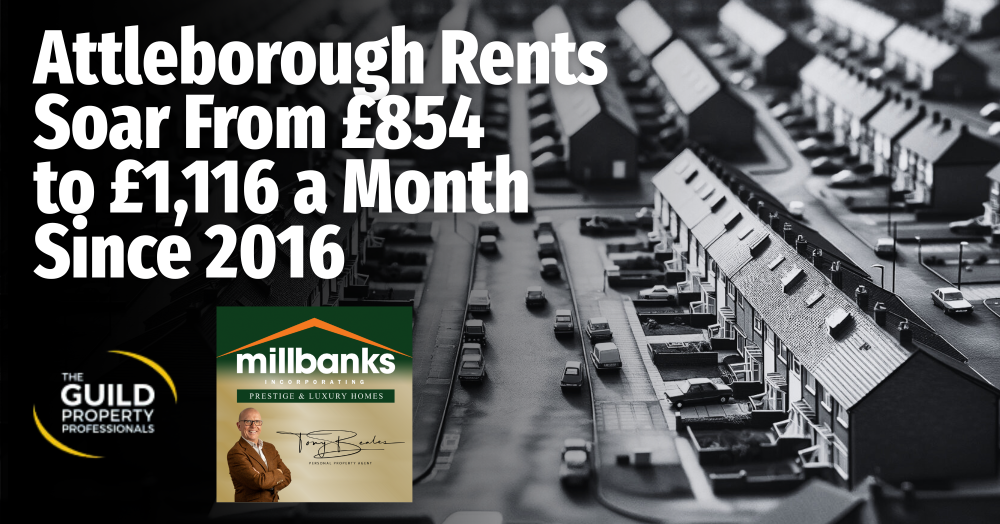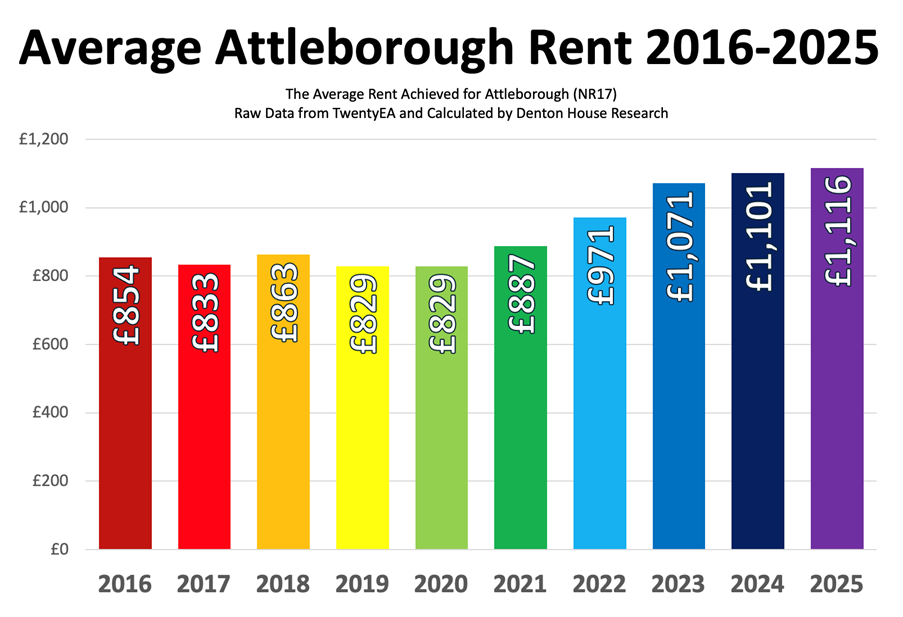
Attleborough Rents Soar From £854 to £1,116 a Month Since 2016
Average rents in Attleborough’s private rental sector have risen 30.7% since 2016, according to TwentyEA and Denton House Research. While this may worry tenants and reassure landlords facing higher costs, the reality is more complex—and context is key to understanding the future of renting.
The private rental sector in Attleborough has seen a 30.7% increase in average rents since 2016, according to data compiled by TwentyEA and Denton House Research. That headline statistic is bound to catch a lot of attention. For tenants, it may raise concerns. For Attleborough landlords, it is a sense of validation after years of rising costs. But as with all things property-related, the truth sits somewhere in the middle—and understanding the context is essential if we’re to have a meaningful conversation about the future of renting.
Wages and Rents: A Surprisingly Similar Trajectory
Looking nationally, what's particularly interesting is how rental growth has aligned with wage growth over the same period. Since 2016, the average UK salary has increased from £28,195 to £37,430—a rise of 32.75%. During that time, the average UK private rent increased by 33.1%.
This correlation tells us something important: rents haven't been rising wildly out of step with what tenants can broadly afford. They're not being driven by greed or opportunism but by the limits of affordability. In other words, most tenants are paying what they can pay—and landlords are charging what the market will bear. While that's a small comfort to someone struggling with rising bills, it does offer a broader economic context. Rent rises are, in effect, following the same path as wages and inflation.
Attleborough rents have risen 30.7% or £262 per calendar month (pcm) from £854 pcm in 2016 to £1,116 pcm in 2025
That is a significant shift in just under a decade.
Yet, things get even more interesting when I break down that growth each year. The growth in Attleborough rents (NR17) isn’t linear.
• 2016 - £854 pcm
• 2017 - £833 pcm
• 2018 - £863 pcm
• 2019 - £829 pcm
• 2020 - £829 pcm
• 2021 - £887 pcm
• 2022 - £971 pcm
• 2023 - £1,071 pcm
• 2024 - £1,101 pcm
• 2025 - £1,116 pcm

Now, note I mentioned inflation in the article. Since 2016, inflation in the UK has been 35.2%. This means Attleborough rents have risen 4.5% less than the rate of inflation.
If Attleborough rents had risen by inflation, they would be £1,154 pcm, instead of £1,116 pcm
So, what does this all mean for Attleborough tenants and Attleborough landlords?
For Attleborough renters, this growth in rents may have meant adjusting expectations, moving to more affordable areas, or simply having less disposable income at the end of the month. With the high cost of living, rent rises can understandably be viewed with frustration or worry.
It's also worth recognising that a significant proportion of those in the rental market fall into the lower quartile income demographic, with many (not all) tenants working in roles that pay just the minimum wage. Encouragingly, the National Minimum Wage has substantially increased over the past decade—from £6.70 an hour in 2016 to £12.21 in 2025, an 82.1% uplift. For many renters, this uplift in wages has played a vital role in helping to offset their rising housing costs, particularly for those in the lower quartile of the income distribution. While challenges around affordability remain, this wage growth has undoubtedly improved the financial resilience of many working households—especially those most likely to rent.
For Attleborough landlords, what’s often missing from this conversation on rent is the increasing pressure landlords have been under during the same period. The cost of maintaining properties has climbed significantly with the cost of materials and labour costs. From energy performance requirements and licensing rules to Section 24 tax changes and interest rate rises, many Attleborough landlords are facing slimmer margins—or, in some cases, losses. Rent, in this context, is not just a fee; it's a reflection of market forces and a necessity to make the provision of private housing viable.
Why This Matters for Attleborough Tenants and Landlords Alike
So, what do we do with all this data?
With Attleborough landlords, it’s about helping you understand tenants' economic pressures while reinforcing the need for fair, sustainable returns on your buy-to-let investments.
With Attleborough tenants, it's about providing transparency and reassurance—showing that Attleborough rent levels haven't skyrocketed in isolation but in line with broader financial trends.
Crucially, for policymakers and housing campaigners, this kind of local data points to the need for localised solutions. There is no ‘one-size-fits-all’ answer to rental affordability. What works in Bradford may not apply in Maidstone, and what's true for a landlord in Truro might be utterly different in Glasgow.
Looking Ahead: What Could Influence Attleborough Rents Next?
The key driver behind rent increases is wages. When minimum wages rise faster than inflation, it naturally expands affordability for tenants—which in turn allows for rents to grow at a similar or slightly higher pace. However, it’s important to strike the right balance. According to data from Denton House Research, around one in five rental properties that came onto the market in the last 12 months have had their asking rent reduced. This suggests there's room to start slightly higher, but if you're not attracting interest, it's crucial to realign your pricing with the actual market rate. Doing so helps avoid prolonged void periods and ensures you secure a tenant without unnecessary delay.
With the Bank of England expected to adjust interest rates between now and the end of the year, landlords' mortgage costs could fall—or rise further, depending on economic conditions. Meanwhile, local councils are under pressure to improve standards and protect tenants from poor practices while encouraging more homes to be made available for rent.
In this uncertain landscape, the best route forward is transparency, empathy, and data-driven conversations.
Recognising the pressures faced by both Attleborough tenants and landlords, and focusing on insight over outrage, is key to shaping a rental market that works fairly for all.